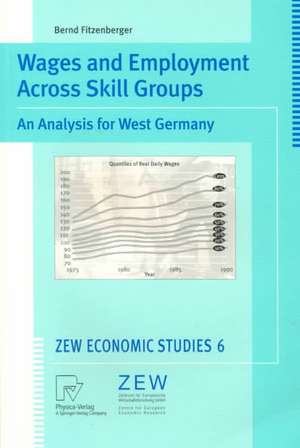Wages and Employment Across Skill Groups: An Analysis for West Germany: ZEW Economic Studies, cartea 6
Autor Bernd Fitzenbergeren Limba Engleză Paperback – 29 oct 1999
Din seria ZEW Economic Studies
-
 Preț: 394.87 lei
Preț: 394.87 lei - 15%
 Preț: 644.18 lei
Preț: 644.18 lei -
 Preț: 379.30 lei
Preț: 379.30 lei -
 Preț: 387.75 lei
Preț: 387.75 lei - 15%
 Preț: 638.57 lei
Preț: 638.57 lei -
 Preț: 389.88 lei
Preț: 389.88 lei -
 Preț: 379.48 lei
Preț: 379.48 lei -
 Preț: 381.43 lei
Preț: 381.43 lei -
 Preț: 381.81 lei
Preț: 381.81 lei -
 Preț: 382.57 lei
Preț: 382.57 lei -
 Preț: 387.96 lei
Preț: 387.96 lei -
 Preț: 379.86 lei
Preț: 379.86 lei - 15%
 Preț: 643.34 lei
Preț: 643.34 lei -
 Preț: 390.25 lei
Preț: 390.25 lei - 15%
 Preț: 640.55 lei
Preț: 640.55 lei -
 Preț: 382.18 lei
Preț: 382.18 lei - 15%
 Preț: 632.70 lei
Preț: 632.70 lei -
 Preț: 385.84 lei
Preț: 385.84 lei - 15%
 Preț: 645.28 lei
Preț: 645.28 lei - 15%
 Preț: 640.88 lei
Preț: 640.88 lei -
 Preț: 386.61 lei
Preț: 386.61 lei -
 Preț: 380.07 lei
Preț: 380.07 lei - 15%
 Preț: 644.63 lei
Preț: 644.63 lei -
 Preț: 389.70 lei
Preț: 389.70 lei - 18%
 Preț: 945.79 lei
Preț: 945.79 lei - 15%
 Preț: 640.88 lei
Preț: 640.88 lei -
 Preț: 383.33 lei
Preț: 383.33 lei - 15%
 Preț: 638.11 lei
Preț: 638.11 lei - 15%
 Preț: 639.25 lei
Preț: 639.25 lei -
 Preț: 385.62 lei
Preț: 385.62 lei -
 Preț: 384.86 lei
Preț: 384.86 lei - 15%
 Preț: 638.57 lei
Preț: 638.57 lei - 15%
 Preț: 633.68 lei
Preț: 633.68 lei -
 Preț: 384.86 lei
Preț: 384.86 lei - 15%
 Preț: 635.15 lei
Preț: 635.15 lei - 15%
 Preț: 653.98 lei
Preț: 653.98 lei - 15%
 Preț: 636.30 lei
Preț: 636.30 lei -
 Preț: 382.18 lei
Preț: 382.18 lei - 15%
 Preț: 639.41 lei
Preț: 639.41 lei -
 Preț: 382.57 lei
Preț: 382.57 lei - 15%
 Preț: 639.59 lei
Preț: 639.59 lei -
 Preț: 389.49 lei
Preț: 389.49 lei - 15%
 Preț: 646.30 lei
Preț: 646.30 lei - 15%
 Preț: 638.43 lei
Preț: 638.43 lei -
 Preț: 383.71 lei
Preț: 383.71 lei -
 Preț: 382.75 lei
Preț: 382.75 lei
Preț: 639.08 lei
Preț vechi: 751.86 lei
-15% Nou
Puncte Express: 959
Preț estimativ în valută:
122.29€ • 127.94$ • 101.59£
122.29€ • 127.94$ • 101.59£
Carte tipărită la comandă
Livrare economică 02-16 aprilie
Preluare comenzi: 021 569.72.76
Specificații
ISBN-13: 9783790812350
ISBN-10: 3790812358
Pagini: 264
Ilustrații: XII, 252 p. 20 illus.
Dimensiuni: 155 x 235 x 14 mm
Greutate: 0.38 kg
Ediția:Softcover reprint of the original 1st ed. 1999
Editura: Physica-Verlag HD
Colecția Physica
Seria ZEW Economic Studies
Locul publicării:Heidelberg, Germany
ISBN-10: 3790812358
Pagini: 264
Ilustrații: XII, 252 p. 20 illus.
Dimensiuni: 155 x 235 x 14 mm
Greutate: 0.38 kg
Ediția:Softcover reprint of the original 1st ed. 1999
Editura: Physica-Verlag HD
Colecția Physica
Seria ZEW Economic Studies
Locul publicării:Heidelberg, Germany
Public țintă
ResearchCuprins
1.Introduction.- 2.Basic Trends in Wages and Employment Across Skill Groups.- 2.1 Employment Trends.- 2.2 Wage Trends Across and Within Skill Groups.- 2.3 Summary.- 2.4 Appendix of Chapter 2.- 3. A Cohort Analysis of Wage Trends.- 3.1 An Empirical Framework to Investigate Uniformity.- 3.2Estimation Results.- 3.3 Summary.- 3.4 Appendix of Chapter 3.- 4. Wages, Prices, and International Trade.- 4.1 Augmenting the HOS Framework.- 4.2 Description of the Data.- 4.3 Descriptive Evidence.- 4.4 Somewhat More Structural Evidence.- 4.5 Conclusions.- 4.6 Appendix of Chapter 4.- 5 The Skill Structure of Labor Demand.- 5.1 A Translog Approach.- 5.2 Data.- 5.3 Empirical Analysis.- 5.4 Simulation Results.- 5.5 Conclusions.- 5.6 Appendix of Chapter 5: Estimation Results.- 6 Heterogeneous Labor in a Model of Wage Bargaining.- 6.1 A Structural Model of Wage Bargaining.- 6.2 Data.- 6.3 Empirical Analysis.- 6.4 Conclusions.- 6.5 Appendix of Chapter 6.- 7 Epilogue.- A Appendix.- A.2 Block Bootstrap Procedure for Robust Inference.- List of Figures.- List of Tables.
Textul de pe ultima copertă
This book explores empirically for West Germany whether a decline in the relative demand for less skilled workers resulted in increased unemployment. Using up-to-date econometric techniques, a balanced mixture between descriptive evidence and structural estimation is provided, and there are various findings in the book which require a modification of the conventional wisdom about labor market trends in West Germany. Overall wage dispersion has been increasing and wage growth has been higher for low-skilled and high-skilled workers compared to the medium skill group. A skill bias in labor demand trends is found and higher wage flexibility could have alleviated the dispersion in unemployment rates across skill groups. The main driving force appears to be technological progress, however, the evidence is also consistent with international trade causing a deterioration in the labor market position of low-skilled workers. With regard to wage bargaining, evidence for a short-run, but not for a long-run, moderation of wage demands is found in the presence of a negative labor demand shock.
















